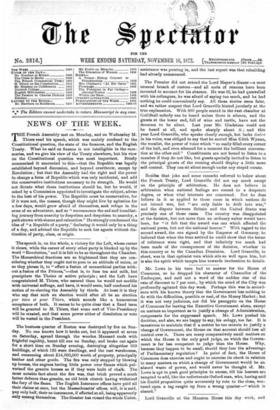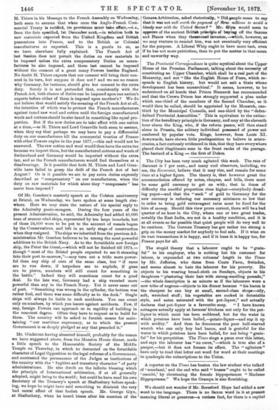Lord Granville at the Mansion House this day week, and
M. Thiers in his Message to the French Assembly on Wednesday, both seem to assume that when once the Anglo-French Com- mercial Treaty is ratified, its provisions must take effect,—i. e., from the date specified, lit December next,—in relation both to raw materials exported from the United Kingdom and British possessions into France, and to the British or Colonial manufactures so exported. This is a puzzle to us, as we have elsewhere fully explained. The French Act of last Session does not permit the duties on raw materials to be imposed unleas the extra compensatory Duties on manu- factures be also imposed, and these last cannot be imposed without the consent of a great many Powers besides England. No doubt M. Thiers expects that our consent will bring their con- sent in its turn, but suppose it does not? and we see no reason why Germany, for instance, should give her consent to the extra duty. Surely it is not pretended that, consistently with the French Act, both classes of duties can be imposed upon one nation's exports before either of them is imposed upon another's ? We do not believe that would satisfy the meaning of the French Act at all, the intention of which was to protect the French manufacturers against taxed raw wool and cotton until the foreign manufactured wools and cottons should be also taxed in something like equal pro- portion. But if the new duties are to take effect with one nation at a time,—as M. Thiers and Lord Granville both seem to assume, when they say that perhaps we may have to pay a differential duty on our manufactures till the commercial treaties of France with other Powers expire in the year 1877,—this end would not be answered. The raw cotton and wool would then have the extra tax because we import them, but the manufactured cottons and wools of Switzerland and Germany would be imported without the extra tax, and so the French manufacturers would find themselves at a disadvantage. Is it possible that both M. Tillers and Lord Gran- ville have failed to grasp the drift of the French Act of last August ? Or is it possible we are to pay extra duties expressly described as " compensatory " on our manufactures, when the duty on raw materials for which alone they " compensate " has never been imposed ?



































